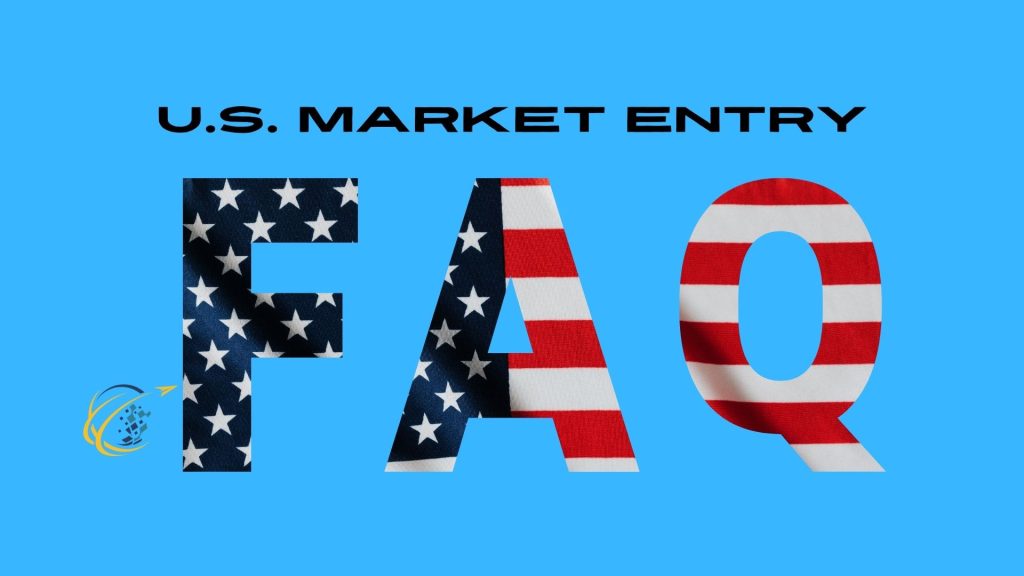 Expanding into the U.S. market presents significant opportunities for foreign businesses but also brings unique challenges that require thorough preparation. Navigating the complexities of U.S. regulations, understanding local consumer behavior, and setting up operational infrastructure are crucial steps. This US Market Entry FAQ addresses common concerns and streamline their entry into the market. From establishing the right business structure to complying with tax laws and employment regulations, companies need to be equipped with knowledge and expert guidance. By planning effectively and adapting to local conditions, foreign companies can position themselves for long-term success in the competitive U.S. market.
Expanding into the U.S. market presents significant opportunities for foreign businesses but also brings unique challenges that require thorough preparation. Navigating the complexities of U.S. regulations, understanding local consumer behavior, and setting up operational infrastructure are crucial steps. This US Market Entry FAQ addresses common concerns and streamline their entry into the market. From establishing the right business structure to complying with tax laws and employment regulations, companies need to be equipped with knowledge and expert guidance. By planning effectively and adapting to local conditions, foreign companies can position themselves for long-term success in the competitive U.S. market.
What Are the Legal Requirements for Foreign Companies Entering the U.S. Market?
When entering the U.S. market, foreign companies must navigate several key legal requirements to operate legally and efficiently. One of the most important steps in the process is registering a business entity. Foreign companies must decide whether to form a branch office or create a separate legal entity. Each structure has its own advantages and disadvantages. The choice will depend on factors like liability, tax obligations, and management preferences.
Obtaining the necessary visas is another critical part of entering the U.S. market. Foreign business owners and employees often need specific visas. These might include the E-2 Treaty Investor Visa, L-1 Intracompany Transferee Visa, or H-1B Visa for specialized workers. These visas allow individuals to legally manage operations or work within the United States. Navigating U.S. immigration laws can be complex, so consulting legal experts or immigration attorneys is recommended.
Another essential step involves complying with U.S. tax regulations. Foreign companies are subject to various taxes, including federal, state, and local taxes. Additionally, transfer pricing, double taxation agreements, and withholding taxes must be understood and addressed to avoid legal issues. Filing for an Employer Identification Number (EIN) with the IRS is also required to conduct business and pay taxes in the U.S.
These legal steps are crucial for a smooth U.S. market entry. The information within this US Market Entry FAQ can help foreign companies streamline their expansion and avoid potential pitfalls. This will ensure a successful transition into the American market.
How Do I Choose the Right Business Structure in the U.S.?
Choosing the right business structure is a critical decision for foreign companies entering the U.S. market. It influences taxes, liability, and management responsibilities. Common structures include Limited Liability Companies (LLCs), corporations, and partnerships, each offering distinct benefits. An LLC provides flexibility in management and tax structure while protecting owners from personal liability. This structure is particularly attractive to small or medium-sized businesses because it allows profits to pass through to the owners without facing corporate tax.
On the other hand, corporations—whether C-corporations or S-corporations—offer more robust liability protection and easier access to capital through investors or stock offerings. A C-corporation faces double taxation, as profits are taxed at both the corporate and individual levels, while an S-corporation allows profits to pass through directly to shareholders, avoiding double taxation but with restrictions on ownership and shareholder numbers.
Partnerships are another option, particularly useful for businesses with multiple owners who want to share profits and management duties. While partnerships provide flexibility and pass-through taxation, they also expose partners to personal liability for business debts. When selecting the right structure, foreign companies must consider factors such as the size of the business, the level of personal liability they are willing to accept, and their long-term business goals.
This decision plays a major role in shaping a company’s operations in the U.S., and addressing this within this US Market Entry FAQ provides crucial guidance. Consulting with legal and tax professionals ensures foreign businesses choose the structure that aligns with their needs and regulatory requirements in the U.S. market.
What Are the U.S. Tax Implications for Foreign Companies?
Foreign companies entering the U.S. market face several key tax obligations that must be carefully managed. At the federal level, foreign businesses operating in the U.S. are typically subject to federal corporate income tax, which applies to income generated from U.S. activities. This can range from 21% to higher rates depending on the structure and location of the business. In addition to federal taxes, companies must also navigate state and local taxes, which vary widely depending on the state or municipality. Each state may impose its own corporate tax rates, and some cities also levy additional taxes, adding complexity to the tax landscape.
Another important consideration is transfer pricing, which applies when foreign companies do business with related entities in the U.S. The IRS requires that transactions between related companies be conducted at arm’s length, meaning they should reflect market value. Proper documentation of transfer pricing agreements is essential to avoid disputes with tax authorities. Additionally, foreign businesses must also understand double taxation agreements, which are treaties between the U.S. and other countries designed to prevent income from being taxed in both countries. These treaties can help reduce or eliminate taxes on certain types of income, such as dividends, interest, and royalties.
Understanding these tax obligations is crucial for foreign companies to avoid penalties and ensure compliance. For businesses addressing these concerns, it’s essential to consult tax professionals who are experienced with international tax laws. By managing federal, state, and local tax requirements, as well as transfer pricing and double taxation issues, foreign companies can position themselves for success in the U.S.
How Can I Effectively Market My Product or Service in the U.S.?
Effectively marketing your product or service in the U.S. requires adapting to the unique preferences and behaviors of American consumers. One key strategy is localization, which involves tailoring your product offerings, marketing materials, and brand messaging to resonate with U.S. audiences. This could mean adjusting product features to meet local tastes, using familiar language, or aligning your branding with American cultural values. Localization goes beyond translation; it’s about ensuring your product feels native to U.S. consumers and stands out in a competitive market.
Digital marketing is another critical component for success in the U.S. market. A strong online presence through platforms like Google, Facebook, and Instagram is essential for reaching a wide audience. Social media marketing, search engine optimization (SEO), and pay-per-click (PPC) advertising help drive traffic and brand awareness. American consumers are highly digital, and businesses need to invest in online advertising to connect with their target demographics. Email marketing and influencer partnerships also play significant roles in engaging consumers and building trust in your brand.
Finally, analyzing consumer behavior is crucial to understanding what drives purchasing decisions in the U.S. market. U.S. consumers value convenience, personalized experiences, and high-quality customer service. By conducting thorough market research and analyzing buying trends, companies can better align their products and services with the expectations of American shoppers. As outlined in this US Market Entry FAQ, a well-researched, localized marketing strategy can significantly boost brand recognition and sales, ensuring a successful expansion into the U.S. market.
How Do I Comply with U.S. Employment Laws and Regulations?
One common US Market Entry FAQ is about complying with U.S. employment laws and regulations is a critical step for foreign companies entering the American market. U.S. labor laws govern everything from hiring practices to employee rights, and it’s essential to understand these rules to avoid legal complications. First, businesses must familiarize themselves with federal laws like the Fair Labor Standards Act (FLSA), which sets minimum wage, overtime pay, and child labor standards. Additionally, companies must ensure equal employment opportunities and avoid discriminatory hiring practices under laws like the Equal Employment Opportunity Commission (EEOC) guidelines. Adhering to these regulations helps create a fair and compliant workplace.
Foreign companies must also manage payroll taxes, which include federal, state, and sometimes local taxes. Businesses are required to withhold income taxes, as well as contribute to Social Security and Medicare on behalf of their employees. Employers must also comply with unemployment insurance taxes and file necessary reports with government agencies. Navigating these tax obligations can be complex, so many businesses opt to work with payroll service providers to ensure accurate tax filings.
Another important aspect of U.S. labor law is obtaining work visas for foreign employees. Employers seeking to bring in foreign talent must navigate the U.S. visa system, which includes options like the H-1B visa for skilled workers or the L-1 visa for intracompany transferees. Visa applications require thorough documentation and compliance with U.S. immigration laws, making the process time-consuming and often requiring legal expertise. Understanding these labor laws and regulations is vital for successfully managing your U.S. workforce and ensuring compliance with employment standards.
What Are the Common Challenges Foreign Companies Face When Expanding into the U.S. Market?
Expanding into the U.S. market presents numerous challenges for foreign companies, including cultural differences, intense market competition, supply chain logistics, and regulatory compliance. Another common US market entry FAQ is how to adapt to cultural differences between the U.S. and other markets. American consumers have distinct preferences and expectations when it comes to products, marketing, and customer service. Companies must understand and cater to these nuances to successfully position their products. Localizing marketing strategies and adapting communication styles to resonate with American audiences can help overcome this challenge. Understanding cultural expectations helps foreign businesses integrate smoothly into the competitive U.S. landscape.
Market competition in the U.S. is another challenge foreign companies face. The U.S. is home to some of the world’s largest and most successful businesses, creating a highly competitive environment. To stand out, foreign companies must differentiate their products and services, either through innovation, pricing, or branding. Conducting thorough market research before entering can help businesses identify niche opportunities and tailor their offerings to better meet local demands.
Supply chain logistics can also be a complex hurdle, given the vast size and regional diversity of the U.S. Companies must navigate different transportation networks, distribution channels, and regional demand variations. Establishing a reliable supply chain is crucial for maintaining product availability and meeting customer expectations. Partnering with local distributors or third-party logistics providers can streamline operations and reduce logistical risks.
What Intellectual Property Protections Are Available in the U.S.?
Securing intellectual property (IP) protections is critical for foreign companies entering the U.S. market. The three primary forms of IP protection in the U.S. include trademarks, patents, and copyrights, each serving a unique purpose. Trademarks protect brand names, logos, and slogans, ensuring that a company’s identity and reputation remain distinct from competitors. Patents safeguard innovations, covering new inventions or processes. Copyrights, on the other hand, protect original works of authorship such as music, literature, or software code. Obtaining these protections helps prevent competitors from using or imitating a company’s intellectual property, thereby securing a competitive advantage.
Foreign companies should ensure they secure IP rights before launching products in the U.S. market. Trademark registration through the United States Patent and Trademark Office (USPTO) is essential for businesses looking to establish brand recognition. Patents also need to be filed with the USPTO. However, companies should be aware that patent protections do not automatically extend beyond the borders of the U.S. Therefore, businesses should consider seeking international protections through agreements like the Patent Cooperation Treaty (PCT).
Intellectual property infringement is a significant risk when entering a new market. To mitigate this, foreign businesses must actively monitor for potential infringements and pursue legal action if necessary. Establishing these protections early can prevent costly legal battles and loss of market share. Addressing IP concerns is essential for any .US Market Entry FA. It should be a top priority for companies seeking to expand into the U.S. market. Protecting intellectual property not only safeguards a business’s assets but also enhances its long-term growth potential.
How Can I Establish Banking and Financial Services in the U.S.?
Establishing banking and financial services in the U.S. is a key step for foreign companies entering the market. The process begins with opening a U.S. bank account. This often requires a few essential documents. Proof of incorporation in the U.S., a Federal Employer Identification Number (EIN), and personal identification for company representatives. Foreign companies must decide whether to open a business account with a local or international bank. Many foreign companies opt for international banks with U.S. branches to simplify the process. Others prefer to work with regional banks for localized services.
Managing currency exchange is another critical aspect of setting up financial services in the U.S. Foreign companies frequently deal with multi-currency transactions, requiring efficient foreign exchange services. Banks or specialized financial services providers offer solutions for managing currency fluctuations and transferring funds between U.S. dollars and foreign currencies. This helps businesses avoid potential losses caused by exchange rate volatility and simplifies transactions with suppliers, partners, and customers.
Foreign companies also need to comply with financial regulations, such as Anti-Money Laundering (AML) laws. U.S. banks and financial institutions are strictly regulated to prevent money laundering and terrorist financing activities. To comply, businesses must maintain detailed records of transactions and meet Know Your Customer (KYC) requirements. These regulations require companies to verify the identities of their clients and report any suspicious financial activities. Adhering to these financial regulations ensures smooth banking operations and minimizes legal risks when entering the U.S. market.
What Are the Key Differences Between the U.S. and My Home Market?
When expanding into the U.S. market, foreign companies often encounter significant differences in consumer behavior compared to their home market. American consumers place high value on convenience, fast service, and customer experience. This often means that businesses need to offer streamlined digital solutions, such as e-commerce platforms and efficient customer support. U.S. consumers also tend to embrace brands with strong messaging around innovation and sustainability. Companies entering the market should adapt their products and marketing strategies to align with these preferences. This ensures they resonate with local buyers.
The regulatory environment in the U.S. can also be quite different from that in other countries. U.S. regulations vary widely at federal, state, and local levels, creating a complex legal landscape. For example, labor laws, tax obligations, and product compliance requirements can differ from one state to another. Foreign businesses must thoroughly understand these regulations to avoid legal risks and ensure full compliance. Seeking guidance from local legal experts and including this information in a US Market Entry FAQ can help companies navigate these challenges effectively.
Business practices in the U.S. often prioritize efficiency, scalability, and innovation. U.S. companies tend to value speed in decision-making and product rollouts, as well as a results-oriented approach. Understanding these business dynamics and adapting management and operational strategies accordingly is crucial for foreign companies to succeed. Additionally, relationship-building and networking play a critical role in U.S. business culture, and companies may need to invest more in developing partnerships and connections to thrive in this market. By recognizing and adapting to these differences, foreign businesses can transition more smoothly into the U.S. market.
How Do I Establish a U.S. Office or Distribution Center?
Establishing a U.S. office or distribution center is a crucial step for foreign companies looking to solidify their presence in the American market. Choosing the right location is the first critical decision. Businesses should consider factors such as proximity to major markets, transportation hubs, and labor availability. For example, companies looking to distribute products efficiently might choose a location near key shipping routes, like ports in California or New York, or near major logistics hubs such as Atlanta or Chicago. On the other hand, tech companies might opt for cities with a strong talent pool, like Austin or San Francisco, to ensure access to qualified employees.
Meeting real estate requirements involves securing commercial or industrial property that meets the specific needs of the business. This could range from warehouse space for a distribution center to office space for a headquarters or regional office. When leasing or purchasing property, businesses must navigate U.S. zoning laws, which dictate how properties can be used. Working with a local commercial real estate agent or attorney familiar with the region is essential for ensuring that the property meets legal and operational requirements.
Managing local staff effectively is another critical aspect of establishing a U.S.-based office or distribution center. This includes hiring employees who understand the local market and can help the company navigate U.S. business practices. Foreign companies must also comply with U.S. employment laws, which cover areas like minimum wage, overtime, and workplace safety. As part of the US Market Entry FAQ, companies should focus on building a strong management team that understands the unique challenges of operating in the U.S. Establishing clear communication between the headquarters and the U.S. office ensures operational alignment and smooth market expansion.
Conclusion
n conclusion, foreign companies looking to expand into the U.S. market must navigate several important considerations. From understanding cultural differences and regulatory requirements to establishing a local office or distribution center, a successful market entry requires strategic planning. Addressing common concerns in this US Market Entry FAQ can help businesses prepare for key challenges like tax compliance, consumer behavior, and managing local operations. With careful research, localization strategies, and a clear understanding of U.S. laws, foreign companies can successfully enter and thrive in the competitive U.S. market. By leveraging local expertise and staying adaptable, businesses can position themselves for long-term success in this dynamic economy.


